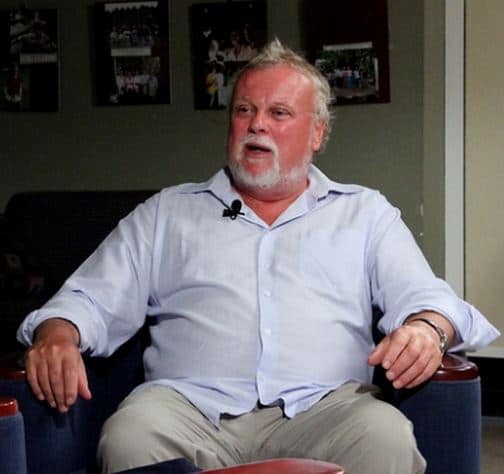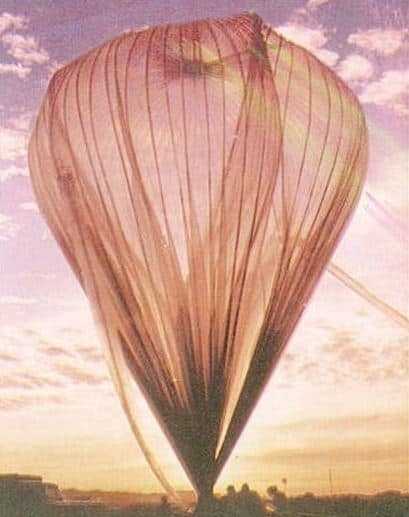Ultra-advanced aliens are sending microscopic capsule spheres to Earth filled with biological material that can evolve into lifeforms, a scientist from the University of Sheffield, Dr. Milton Wainwright says. He adds that he has proof of this.
Dr. Wainwright, a microbiologist who works at the University’s Department of Molecular Biology and Biotechnology, is convinced that alien precursors to life are floating 25 miles up in our atmosphere in tiny capsules.
He has been trying to convince the scientific community, without much success so far, that Earth is the target of some advanced civilization from outer space. After emailing his students with details of his findings, some of them posted what he wrote on the entertainment, social networking and news website Reddit.

Could this be an alien ‘seed of life’ capsule sent to Earth by intelligent aliens? Dr. Wainwright thinks it is. (Image: University of Buckingham)
Dr. Wainwright has made other claims which have raised eyebrows among those in the scientific community. He claimed that the red rain in Kerala was a biological entity, Hitler’s life was saved by penicillin, and that non-virus microbes, including bacteria, cause cancer.
Are we being observed from afar?
Dr. Wainwright published his findings in the Journal of Cosmology, which many in the scientific community have criticized for its dubious peer-review process.
Swedish researchers claimed to prove in 2011 that genetic material can survive the hostile environment of outer space when they sent a tiny ‘plasmid’ on the exterior of a TEXUS-49 rocket from Kiruna in Northern Sweden. During its 13-minute flight the external temperature of the rocket peaked at 1000°C, and to the surprise of the scientists the DNA was not denatured (remained intact).
The tiny metallic sphere Dr. Wainwright and his team discovered is made from titanium and vanadium. He says that some kind of biological liquid is oozing out of it.
Regarding the capsule, Dr. Wainwright said:
“It is a ball about the width of a human hair, which has filamentous life on the outside and a gooey biological material oozing from its centre. We were stunned when X-ray analysis showed that the sphere is made up mainly of titanium, with a trace of vanadium.”

Dr. Milton Wainwright.
“One theory is it was sent to Earth by some unknown civilisation in order to continue seeding the planet with life. Unless of course we can find details of the civilisation that is supposed to have sent it in this respect it is probably an unprovable theory.”
Came in from space at high speed
The scientific team, led by Dr. Wainwright, had sent up balloons into the upper atmosphere to collect debris from space. They say the capsule landed on one of the balloons, leaving a small impact crater, suggesting it had come from outer space at very high speed rather than from the Earth’s surface.
In an interview with Jason Koebler at Motherboard, Dr. Wainwright said:
“We sent balloons and a sampler and found no pollen or grass, nothing up there to contaminate, it was completely pristine. For these reasons, we think [the contents] are coming from space.”
“All the time when you walk outside, you are being pelted with organisms that come from space.”

One of the balloons used to sample the stratosphere for microbes in an attempt to demonstrate neopanspermia – the view that life (microbes) are continually arriving to Earth from space. (Image: University of Sheffield)
He also told the Mail Online:
“The critics claim that the samples we obtained must have come from Earth, that it that there must be a mechanism which can lift these particles from Earth to the stratosphere. However, we have provided evidence that the DNA-containing masses, plus other strange organisms we have isolated are not associated with pollen, grass and fungal spores on our sampler.”
“If our organisms came from Earth they must be contaminated with common Earth organisms and they are not. We will probably not be believed until NASA repeats our findings.”
“I suspect that NASA will then try and take the credit by claiming that their methods were somehow more sterile or precise.”
Dr. Wainwright is Honorary Professor and Fellow of the Buckingham Centre for Astrobiology, University of Buckingham, England; Honorary Professor, King Saud University, Saudi Arabia; and Honorary Professor, Cardiff University, Wales.
Video – Heresy in science
In this University of Sheffield video, Dr. Wainwright talks about heresy in science.

